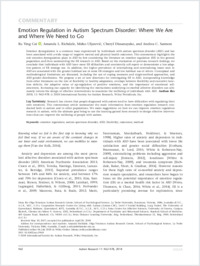Emotion regulation in autism spectrum disorder : where we are and where we need to go
- Cai, Ru Ying Olga Tennison Autism Research Centre, School of Psychological Science, La Trobe University
- Richdale, Amanda L. Olga Tennison Autism Research Centre, School of Psychological Science, La Trobe University
- Uljarevic, Mirko Olga Tennison Autism Research Centre, School of Psychological Science, La Trobe University
- Dissanayake, Cheryl Olga Tennison Autism Research Centre, School of Psychological Science, La Trobe University
- Samson, Andrea C. Swiss Center for Affective Sciences, University of Geneva
-
2018
Published in:
- Autism Research. - 2018, vol. 11, no. 7, p. 962-978
English
Emotion dysregulation is a common issue experienced by individuals with autism spectrum disorder (ASD) and has been associated with a wide range of negative mental and physical health outcomes. This commentary highlights the role emotion dysregulation plays in ASD by first considering the literature on emotion regulation (ER) in the general population and then summarizing the ER research in ASD. Based on the evaluation of previous research findings, we conclude that individuals with ASD have more ER difficulties and consistently self-report or demonstrate a less adaptive pattern of ER strategy use. In addition, the higher prevalence of internalizing and externalizing issues seen in ASD are associated with the greater habitual use of some ER strategies and less habitual use of others. Conceptual and methodological limitations are discussed, including the use of coping measures and single-method approaches, and ASD gender distribution. We propose a set of new directions for investigating ER in ASD, incorporating knowledge from other literatures on the role of flexibility in healthy adaptation, overlaps between flexibility and executive function deficits, the adaptive value of up-regulation of positive emotions, and the importance of emotional selfawareness. Increasing our capacity for identifying the mechanisms underlying co-morbid affective disorders can ultimately inform the design of effective interventions to maximize the wellbeing of individuals with ASD.
- Faculty
- Faculté des lettres et des sciences humaines
- Department
- Département de Pédagogie spécialisée
- Language
-
- English
- Classification
- Special education
- License
-
License undefined
- Identifiers
-
- RERO DOC 333149
- DOI 10.1002/aur.1968
- Persistent URL
- https://folia.unifr.ch/unifr/documents/309499
Statistics
Document views: 236
File downloads:
- Fichier principal: 2286
